Emily Watson & David Wenham Oranges and Sunshine Cast Interviews
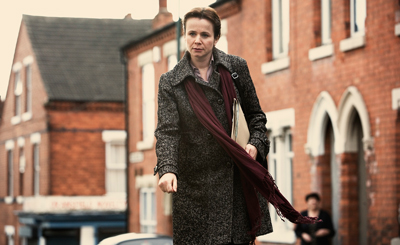
Oranges and Sunshine Cast Interviews
Cast: David Wenham, Emily Watson, Hugo WeavingDirector: Jim Loach
Genre: Drama
Rated: M
Running Time: 105 minutes
Synopsis: The story of Margaret Humphreys (Emily Watson), a social worker from Nottingham, who uncovered one of the most significant social scandals in recent times: the organised deportation of children from the UK to Australia during the 40s and 50s, some without their parent's knowledge.
Almost single-handedly, against overwhelming odds and with little regard for her own wellbeing, Margaret reunited thousands of families, brought authorities to account and worldwide attention to an extraordinary miscarriage of justice.
Release Date: June 9th, 2011
Interview with Emily Watson
Emily Watson plays Margaret Humphreys.Question: How would you describe what Oranges and Sunshine is about?
Emily Watson: It's about bearing witness to the terrible abuse of innocent children that could have gone without notice. And it's about one person's fight to have that story known, and to give those people some sense of identity.
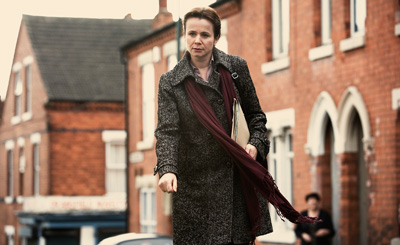 Question: Had you heard about the events the film depicts before?
Question: Had you heard about the events the film depicts before?Emily Watson: I hadn't heard of them at all, no and I think it's been a very, very little known fact. It's better known in Australia obviously because the migrants are there, but in England, no I'd no idea … outrageous really. Now it's obviously coming much more into the public eye because of the apologies in both countries.
Question: Why did you want to be in this film?
Emily Watson: It's an amazing story: it's just very, very powerful, compelling stuff. It was nearly two years ago when I met with Jim Loach, Director on a very snowy day in London. My son Dylan was six weeks old and we sat and talked about it for hours. It was one of those things that just felt right from the off.
Question: Tell us about your character?
Emily Watson: I play Margaret Humphreys who works for Nottinghamshire County Council social services - she's someone who bears witness to people's suffering. At the very beginning of the film she's approached by a woman who says, 'I was sent to Australia from England as a small child without parents or guardians and that's all I know. Can you help me?' Margaret's first reaction is disbelief. So she starts following the trail and uncovers this incredible story - the woman is just the tip of the iceberg. When she first starts looking in to it back in the 80s her boss says to her, 'Do you want to take a year or two to do this?' - and in reality it's been her entire life ever since then. It takes an incredible toll on her physically and mentally and emotionally. She tells herself that she's keeping her distance, that she has boundaries, but in fact she is diagnosed with post-traumatic stress disorder, just because of the emotional impact of where she'd been and what she'd been hearing.
Question: Did you meet Margaret in real life?
Emily Watson: No. I thought long and hard about it and every day when we were filming I would say to myself, 'Maybe I should have met her,' for this reason or that. But I've played real people before and in a way you almost get too close - it's very difficult to be objective about them. And also the way they are physically, the way they sound, becomes a very, very strong imprint and sometimes that's not helpful when you're trying to tell a story. You end up just trying to mimic them. But because it's a film - it's a story - you have to occupy it in a different way.
Question: Was Margaret's look helpful in mapping out her character?
Emily Watson: I think Jim Loach had a very strong image before we started of how he wanted her to look - professional, sharp, self-assured. So I've spent a lot of time wandering around in the blazing heat in Australia, very unsuitably dressed in a suit and stockings and heels and dying of heat! But that's her look: she's quite buttoned up. Whenever she's dealing with migrants or going to these places she used to research she's always dressed for work and I think that's part of her. She has a uniform. It means that when she takes it off at the end of the day she can let it go a bit.
Question: What other research did you do for the role?
Emily Watson: Well there's obviously Margaret's book [Empty Cradles] and there are various documentaries, but for me the most important territory is the emotional stuff and that comes from having your own family and children. It's just putting yourself in to that imaginative area of what it would be like to be dealing with all this stuff. There is something utterly, utterly compelling about the thought of your own child being abandoned and deported and sent to an abusive children's home for ten years.
Question: What's been the most enjoyable part of this role?
Emily Watson: I think the most enjoyable thing for me on this film has been the crew and the company. I don't think I've ever worked on a film where just everybody is universally nice. I know that sounds really urgh, but it's so often the case that there's a sort of macho, hysterical aspect to film-making. There's been no tension like that at all and that really comes from Jim Loach - he is incredibly laidback and polite with everybody. The producers took their lead from him and so everyone was just treated properly like human beings. When the work you're doing is very emotional that's just great - there's none of that kind of posturing and bullshit going on.
Question: Describe Margaret's relationship with Len
Emily Watson: I don't think it's a relationship I've seen on film before. They're quite the odd couple. Len is wanting to trace his mother, but being very, very difficult with Margaret and quite difficult to handle. We go through this process where I take him to the point where he goes to meet his mother and get him to peel back a few layers and stop being such a tosser. But then after that he's the only character in the film who really challenges Margaret and says, 'You have to go to the Boys Town at Bindoon where a lot of the really, really bad abuse took place. Unless you've been there and seen it you haven't really fully embraced who these people are.' So he forces her to do something she doesn't want to do. It's a really lovely journey in the story between the two of them, but it's unusual - it's not sexual, it's not romantic, but it's very intense.
Question: What is Jim Loach like as a director?
Emily Watson: Many of the scenes we shot involve stories of abuse or the death of a parent. Jim would give the actor full reign to be as emotional as they felt was right but then he'd always say, 'Okay, let's bring it back. Let's do it smaller.' That's very much his taste, to bring everything right down and keep it contained. There are so many of these tales to tell in the film and I think you just can't keep it up at that level of intensity. You've got to measure it out.
Question: What's it been like shooting a film across two countries and continents?
Emily Watson: We filmed in Nottingham in November and it was pretty cold. All the Australian crew were shivering and complaining! It starts getting dark almost after lunch and the light is so completely different from Australia. But I think that really reflects the nature of the film, the nature of the story and that sense of dislocation that a person must feel who's constantly travelling between the two - it was tough.
Interview with Hugo Weaving
Hugo Weaving plays Jack.Question: What attracted you to the project?
Hugo Weaving: I got the script with a covering letter saying that Emily Watson was involved and that Jim Loach was directing. The material's just so moving and beautifully written, so it was something I was instantly grabbed by. Once I'd met Jim I was even more interested; I just thought he was a delightful person, very warm and kind of quiet, but intelligent. I was very excited about the idea of working with Emily Watson, and I also knew that David Wenham was involved, so it was the whole package.
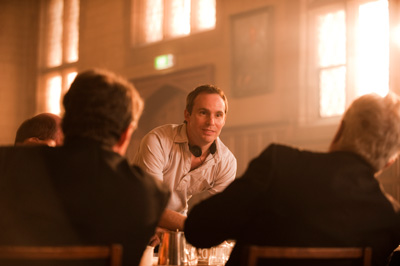 Question: Who is Jack?
Question: Who is Jack?Hugo Weaving: Jack just seemed to me to be a man crying out to be accepted and to have his story recognised. He's a very gentle soul, a lost soul, quietly working to find something in an undemonstrative way. When we meet him he's still going through a great deal of issues and a lot of pain. He is estranged from his family as well as from his mother and father - he assumes they're dead. But he's just linked up with his sister again.
Question: What is his story as shown in the film?
Hugo Weaving: Nicky, Jack's sister, is part of Margaret's group in Nottingham and she tells them a story about having found her brother again and shows them a photo of Jack. Quite soon after that Nicky's persuaded by Margaret to go and see Jack again. They've obviously met up before a couple of times and so we first meet Jack at Melbourne Airport, when Nicky and Margaret arrive. Initially he's very mistrustful of Margaret. Even though he can see that her intentions are probably good, I think he has a great mistrust of social workers, psychiatrists, anyone in bureaucracy, in positions of power or administration. He basically says to Margaret, 'I was told as a child that my mother was dead; now you're telling me she might be alive, but I don't really know what to do with that information'. I think he feels at that stage that he doesn't know whether he would have the strength to meet his mother. But the journey is embarked upon to try and find her.
Question: Did you know about the story before you read the script?
Hugo Weaving: I was pretty ignorant of the story really, although I'd seen The Leaving of Liverpool [an Australian television drama about the child migrants] many years before so I suppose I did know something about it. Just not the extent of it - that so many young kids had been sent out. The next step after talking to Jim and committing to doing it was reading Margaret's book, and then I wanted desperately to meet the man on whom Jack is partially based - someone who'd actually come out and had that experience themselves. I was doing a play in Melbourne and I got to meet this wonderful man who'd been sent out as a child from England at the age of ten. He was incredibly forthcoming and generous with his time and we sat and talked for about three hours. That was a wonderful thing to do.
Question: What did you discuss?
Hugo Weaving: The school he'd been to, his early life, his marriage, his kids and then his descent into depression; his attempted suicide and his finding his way out of that. Then he tried to contact his mother and get in touch with his sister and then he met Margaret. It was an invaluable experience talking to him and that was my primary research.
Question: What was the impact of the government apologies while you were filming?
Hugo Weaving: The day I left for the shoot in England Kevin Rudd apologised, and so by the time I landed all the English papers were full of it - which is extraordinary really after such a long time. I was driving along in the afternoon listening to the PM crying; it was incredibly moving and just so tragic. All these people have probably tried to tell their stories many times but no one's really listened. So for it to suddenly break in that way must have been an incredible vindication of who they were and where they'd been and what happened to them. But at the same time it seemed extraordinary that it should have taken so many years
Question: What are the challenges for an actor playing a real-life character?
Hugo Weaving: With any character the challenge is to do as much research and psychological investigative work as possible, in order to try to understand their motivations and complex psychology. Then you have to let go of all of that and just try to exist on the day in the moment. In a way these characters come with added pressure - you're trying to be faithful to them and their experience and so maybe there's an added sense of… I don't know that 'duty' is the right word, but trying to do the right thing by a person or by a group of people.
Question: What's it been like working with Emily Watson?
Hugo Weaving: Really delightful. She's such an intelligent and sensitive and very present human being. I suppose I don't really know her very well, but I've always loved her work from Breaking the Waves through to Synecdoche and everything in between, so I was really thrilled with the idea of working with her.
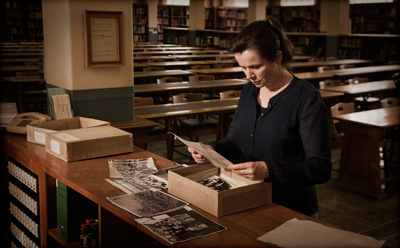 Question: How is Jim Loach as a director?
Question: How is Jim Loach as a director?Hugo Weaving: He's a lovely, calm, sweet man and he's obviously intelligent and knows what he wants. We sometimes didn't know whether it was a take or a rehearsal, which is always a good thing because it means it's seamless. It all seems to have the same uncomplicated energy to it. He has a great empathy for the characters.
Question: How would you describe what Oranges and Sunshine is about?
Hugo Weaving: Well it's interesting that the title Oranges and Sunshine is something that Jack says. He was asked as a child whether he wanted to go to Australia where he could live in a white house, ride a horse to school and be able to pick oranges off the trees for his breakfast and where the sun shines every day. That was the sort of golden promise that these children were sold and then in the same breath someone said to him, 'Well you might as well go because your mum's dead.' So it was sold as a wonderful world they were going to, a wonderful new life for them and yet at the same time they were told their parents had died. 'Oranges and Sunshine'? It's the great promise and the great lie, the great untruth that was told to these innocent children who were damaged for so many, many years and probably irrevocably. And it's the journey that Margaret takes to try to heal that and give them some sense of who they are and what has happened to them, gain them some sort of recognition. So to me it's really about abandonment and lies and then being accepted again.
Interview with David Wenham
David Wenham plays the character, Len.Question: What attracted you to the film?
David Wenham: It was the idea of the film, what the film dealt with. I was aware of the forgotten children but I've got to be honest, I wasn't aware of Margaret Humphreys. Reading her story I've found it absolutely compelling, an incredible story. Then the pedigree of the people involved in the project as well: Jim who is extremely impressive, having Emily on board who I've worked with before, and also Hugo meant it was just a fantastic team to collaborate with.
Question: What did you know about the child migrants before?
David Wenham: I don't know anybody personally who was or is a forgotten child. There are some people within the public sphere, for example David Hill who is the head of the ABC, and I've read about his personal story. I watched The Leaving of Liverpool some years ago, so I was aware of it from that perspective. But it was terrific when the script came along to revisit something that's been a forgotten issue, and of course it's been interesting that it has actually come to the fore over the past few months with the official apology from the Australian and the British government. The film is very timely in that regard.
Question: Describe Len
David Wenham: Len's a very interesting character because he deals with his history in a way that one wouldn't expect or anticipate - not that there's any normal way to be able to deal with the history that these people have gone through. There are huge barriers that he's put up around himself in an attempt to deal with his past. There's a terrific line in the script actually: he says that he stopped crying at the age of eight and he doesn't know how to cry anymore. That line sums up who he is, the essence of the man.
Question: What is his relationship with Margaret?
David Wenham: They're two opposing forces. They challenge each other and she's a rare person who can meet the challenge and stand up to Len. He's a demanding, charismatic, irritating guy - a really, really complex man - but his thorny exterior is all due to the first dozen or so years of his life.
Question: What is Len's story as told by the film?
David Wenham: You meet him and he comes up against Margaret pretty much straightaway. He's suspicious of her. He doesn't think she's really worth considering, nor her offer of helping him trace his family history. He's been down this track before. He's paid a lot of money - he's constantly on about the money, the fact that he has the money - to have a private detective try and find out his family history with little result, so he's suspicious of Margaret. But Margaret, to her great credit, really puts him in his place and I think over time what you see through the film is that suddenly Len seems to understand Margaret and respects Margaret for what she does. Through this relationship you see Len open up as much as you're ever going to see him open up to anybody - it's only a small amount, but at least he does.
Question: How did you conduct your research?
David Wenham: I was fortunate to be introduced to somebody who went not to Bindoon, but to Clontarf in Perth. I spent two days with him and he took me up to Bindoon and he took me to Clontarf as well and over that period he opened up and told me his personal story and history. It was through listening to him more than anything that I got an insight into what our fictional character of Len must have a) gone through and, b) how he actually responds in reality to the events. So that was the biggest thing for me, actually spending time with this gentleman. He was extremely gracious and generous with his time and his stories, which are obviously very dear and precious to him.
Question: What information did he give you that helped your portrayal?
David Wenham: One of the most moving things was actually going to The Child Migrants House in Perth. He's one of the guys who runs the house and there are photographs everywhere of the kids when they arrived, when they were four or five with their little luggage. The expressions on those children's faces… I could look at them for hours. Some of them were extremely happy to be in a place that would have been like another planet for them; others total bewilderment. Those photographs did it for me. And also when he took me out to Bindoon and to Clontarf… they haven't changed very much. And then to see the photographs of the children actually physically building these places. Kids five, six, seven, carting huge sandstones. The [Christian] Brothers had developed these contraptions so that they could actually lift these things that were far heavier than themselves. Extraordinary stuff. And stuff that I would never have thought about had I not been involved in this film.
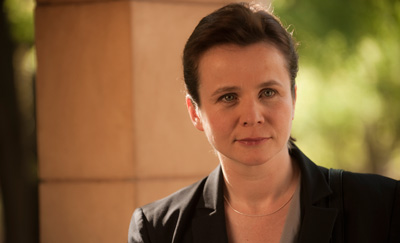 Question: How has it been working with Emily Watson?
Question: How has it been working with Emily Watson?David Wenham: A couple of months before I was doing this film, I'd mention to people that I was doing it and without exception everybody said, 'Emily Watson? I love Emily Watson.' And this could be my neighbour; it could be other film directors. She's so highly regarded and she's certainly incredibly talented, but her choice of films has been really smart as well. She could have easily gone down a much more commercial route if she wanted to, but she didn't. She wanted to do really interesting films about interesting things and work with interesting people. I think that's the right way to go.
Question: And Hugo Weaving?
David Wenham: I rate Hugo probably the best actor in Australia. I'd put him number one. I actually think Hugo's getting better and better as an actor as time goes on. I reckon most people do their best work about 30, but Hugo just keeps improving. I think he's amazing.
Question: So what would you like audiences to take away from Oranges and Sunshine?
David Wenham: I don't think films should be didactic or should tell people what they should think or feel. I think what they'll get from the film though is an incredibly powerful story.
MORE
- Emma Stone Magic in the Moonlight
- Jessica De Gouw Cut Snake
- Maxine Peake Funny Cow
- Denzel The Equalizer 2
- Johnny Flynn Beast
- Logan Marshall Green Upgrade
- Shailene Woodley Adrift
- Eric Toledano and Olivier Nakache C'est La Vie...
- André Leon Talley The Gospel According To André...
- Shakespeare In Tokyo
- Mission: Impossible Fallout
- Glenn Close The Wife
- Allison Chhorn Stanley's Mouth Interview
- Benicio Del Toro Sicario: Day of the Soldado
- Dame Judi Dench Tea With The Dames
- Sandra Bullock Ocean's 8
- Chris Pratt Jurassic World: Fallen Kingdom
- Claudia Sangiorgi Dalimore and Michelle Grace...
- Rachel McAdams Disobedience Interview
- Sebastián Lelio and Alessandro Nivola...
- Perri Cummings Trench Interview



